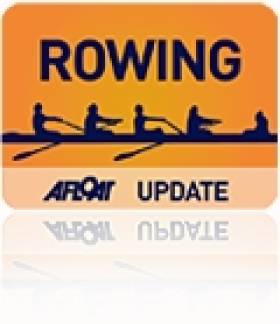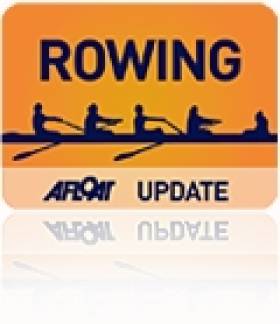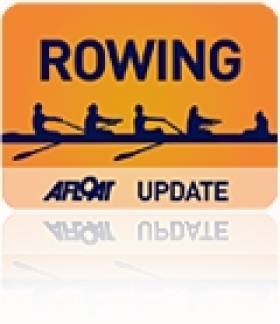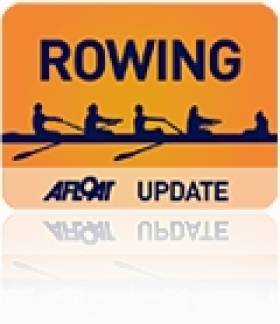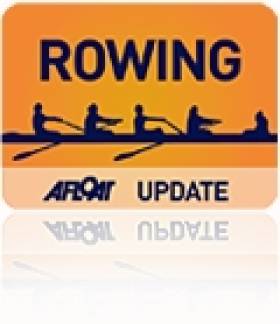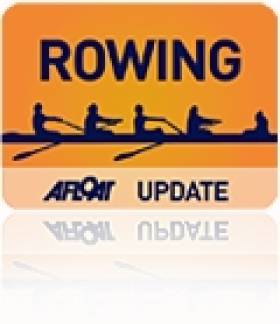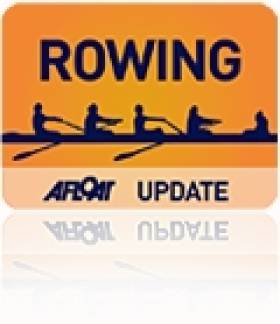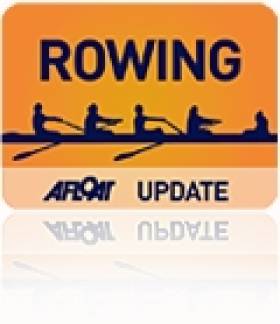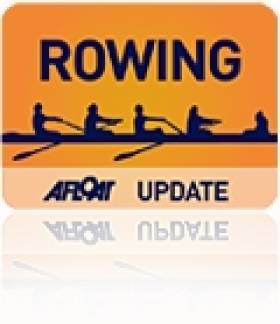Displaying items by tag: Rowing,
# ROWING: Sanita Puspure finished sixth in the World Cup Regatta in Munich today. Puspure had a disappointing start, while Denmark’s Fie Udby Erichsen of Denmark, in the lane beside her, shot away from the field. Puspure recovered, but by the closing stages, when Ekaterina Karsten took over the lead to win, Puspure had faded back to sixth. Emma Twigg of New Zealand took silver and Donata Vistartaite of Lithuania was third, with Erichsen having to settle for fourth.
World Cup, Munich (Irish interest)
Men
Lightweight Four: 1 Britain (P Chambers, R Williams, R Chambers, C Bartley) 6:16.34, 2 Australia 6:18.81, 3 Denmark 6:19.49.
Single Scull – A Final: 1 Germany (M Hacker) 7:07.31, 2 Sweden (L Karonen) 7:09.27, 3 Britain (A Campbell) 7:12.74.
Women
Single Scull – A Final: 1 Belarus (E Karsten) 7:52.74, 2 New Zealand (E Twigg) 7:56.22, 3 Lithuania (D Vistartaite) 7:58.60; 4 Denmark (FU Erichsen) 8:02.80, 5 Azerbaijan (N Mustafayeva) 8:09.03, 6 Ireland (S Puspure) 8:15.05.
# ROWING: Sanita Puspure moved into the A Final of the World Cup in Munich today with a steady performance which saw her finish third in the semi-final behind Nataliya Mustafayeva of Azerbaijan and Emma Twigg of New Zealand. Puspure established her hold on third by the middle stages of the race and let the top two fight it out while she saw off a challenge by Talia Gjoertz of New Zealand with an effective push.
Puspure also made the A Final in the other World Cup in which she competed, in Belgrade last month. She finished fifth.
Claire Lambe finished 15th overall in the lightweight single scull. She finished third in the C Final: leading into the closing stages, she was passed by both Anna Ioannou of Cyprus and, coming up to the line, Lila Perez Rul of Mexico.
Ireland's Adpative mixed coxed four won their B Final to finish seventh overall.
World Cup Regatta, Munich (Irish interest)
Women
Single Scull – Semi-Finals (First Three to A Final; rest to B Final) – Semi-Final One: 1 Belarus (E Karsten) 7:59.28, 2 Denmark (FU Erichsen) 8:01.68, 3 Lithuania (D Vistartaite) 8:03.58. Semi-Final Two: 1 Azerbaijan (N Mustafayeva) 8:08.36, 2 New Zealand (E Twigg) 8:12.60, 3 Ireland (S Puspure) 8:15.32; 4 Norway 8:17.43, 5 Italy 8:24.12, 6 8:26.14.
Lightweight Single – C Final (places 13 to 18): 1 Cyprus (A Ioannou) 8:05.74, 2 Mexico (L Perez Rul) 8:10.38, 3 Ireland (C Lambe) 8:14.94, 4 Hong Kong 8:17.74, 5 Croatia 8:23.63. Finland did not start.
Adpative - Legs, Trunk and Arms Mixed Coxed Four (1,000m) – B Final (Places 7, 8): 1 Ireland (AM McDaid, S Caffrey, S Ryan, K du Toit; cox: H Arbuthnot) 3:44.18, 2 Belarus 3:51.75
Athlone Rowing Regatta Cancelled
# ROWING: Athlone Regatta, which was scheduled for Coosan Point tomorrow (Saturday) has been cancelled. The organisers made the decision today because the wind and the flood levels were too variable.
# ROWING: Sanita Puspure held off Germany’s Peggy Waleska to take second place in her heat and secure automatic qualification for tomorrow’s semi-final of the single scull at the World Cup regatta in Munich. The race was won well by Fie Udby Erichsen of Denmark.
Waleska is chasing selection by Germany as their representative in London 2012, but she could not catch Puspure, who was competing for the first time since she secured her spot at the Olympic Games.
Claire Lambe finished third in her heat of the lightweight single scull and third again in her repechage, where she was outsprinted for the crucial second place. The Ireland Adaptive Four missed out on an A Final place when they finished a close-up fifth in their repechage.
World Cup, Munich (Irish interest)
Women
Single Scull (First Two Directly to A/B Semi-Finals; rest to Repechages) – Heat One: 1 Belarus (E Karsten) 7:46.62, 2 Norway (T Gjoertz) 7:53.27. Heat Two: 1 Denmark (FU Erichsen) 7:46.50, 2 Ireland (S Puspure) 7:51.85; 3 Germany 7:54.79, 4 Lithuania Two 8:14.10, 6 Korea 8:18.66. heat three: 1 Azerbaijan (N Mustafayeva) 7:50.53, 2 Lithuania (D Vistartaite) 7:54.00. Heat Four: 1 New Zealand (E Twigg) 7:45.76, 2 Serbia (I Obradovic) 7:49.23.
Lightweight Single Scull, Heat Three (First Directly to A/B Semi-Final, rest to Repechage): 1 Germany (L Pless) 8:04.51; 2 Sweden 8:05.33, 3 Ireland (C Lambe) 8:17.16, 4 Finland 8:20.69, 5 Algeria 8:26.75. Repechage One (First Two to A/B Semi-Finals): 1 Switzerland (P Weisshaupt) 7:51.00, 2 Hungary (Z Hajdu) 7:54.57; 3 Ireland (Lambe) 8:01.01, 4 Mexico 8:05.48.
Adaptive - Legs, Trunk and Arms Mixed Four, coxed (1,000m) – Heat One (First to A Final; rest to Repechage): 1 Britain 3:34.42; 2 France 3:40.69, 3 Ireland (A-M McDaid, S Caffrey, S Ryan, K du Toit; H Arbuthnot) 3:48.64, 4 Belarus 3:58.35. Repechage (First Four to A Final): 1 Ukraine 3:32.65, 2 Canada 3:37.14, 3 France 3:37.16, 4 Brazil 3:40.78; 5 Ireland 3:41.04, 6 Belarus.
# ROWING: Ireland's Sanita Puspure, who recently qualified for the Olympic Games, will compete at Henley Royal Regatta. The Old Collegians woman takes part in the World Cup in Munich this weekend.
Entries for Henley Royal Regatta (Irish interest)
Temple: Trinity
Remenham: UCD
Visitors’: Queen’s
Wyfold: Cork BC
Queen Mother: UCC/London RC
Prince Albert: Queen’s
Diamond Sculls: J Keohane (Lee Valley); C Williamson (Queen’s)
Princess Royal: S Puspure (Old Collegians)
Carlow Gives Young Crews Full Day of Rowing
#ROWING: Carlow overcame cold conditions to run 11 hours of racing, mostly for young athletes, today. The big entry came from as far apart as Portora in Enniskillen and Fermoy in Cork.
Carlow Regatta, Sunday
Men
Eight – Masters: Carlow/Commercial/Neptune bt Athlone.
Sculling, Quadruple – Novice: Neptune bt New Ross. Junior 18: Carlow bt Neptune. Junior 16: Athlone bt Portora.
Double – Senior: Carlow A bt Carlow B. Novice Commercial bt Neptune. Junior 18: Carlow A bt Carlow B. Junior 16: Commercial bt Waterford.
Single – Senior: Carlow (Bolger) bt Carlow (Coughlan). Intermediate: Carlow (Murphy) bt Carlow (Ayers). Novice: Cappoquin bt Waterford. Junior 18: Carlow (Byrne) bt Carlow (McGrath). Junior 16: Commercial (Carroll) bt Athlone (Hannon). Masters A: Offaly (Hussey) bt Three Castles (Murphy). Masters B: Portora (Murphy) bt Commercial (Crowley)
Women
Sculling, Quadruple – Novice: New Ross bt King’s Hospital. Junior 18: Athlone bt Portora. Junior 16: Carlow bt Portora. Masters: New Ross bt Offaly.
Double – Intermediate: Carlow bt Fermoy. Novice: Cappoquin A bt Cappoquin B. Junior 18: St Michael’s bt St Michael’s. Junior 16: Carlow bt Portora.
Single – Novice: Fermoy (Costigan) bt Offaly (Piggott). Junior 18: Portora (Mulligan) bt St Michael’s. Junior 16: Fermoy bt Graiguenamanagh.
Belfast Boat Club and Bann Win at Rowing Regattas
#ROWING: Belfast Boat Club and Bann had a fine weekend at regattas in England. On Saturday, Bridget Jacques and Lucy Litvack won the Girls’ Championship Doubles at the British Schools Championships in Nottingham – and Katie Cromie took third in the Championship Single. Bann, through Joel Cassells and Chris Black, won the Boys’ Championship Pair today (Sunday) .
The BBC double of Jacques and Litvack went on to win the Intermediate One double scull at Metropolitan Regatta at Dorney Lake. Other winners from Irish clubs at the Olympic venue included UCD women’s crews, who took the Senior coxless fours and the Intermediate coxed fours today and Colin Williamson of Queen’s University, who won the Senior single scull on Saturday.
University Boat Races, Belfast
Men – Senior: Queen’s bt Cambridge. Fresher: Queen’s bt Trinity.
Women – Senior: Queen’s bt Cambridge. Fresher: Queen’s bt Methodist College, Belfast.
Metropolitan Regatta, Dorney Lake, England (Irish interest; selected results, finals)
Saturday
Men
Eights, Elite: 5 Grainne Mhaol/NUIG 6:27.47
Senior: 4 Grainne Mhaol/NUIG 6:32.90
Intermediate Two: 4 UCD 6:44.62
Fours, Intermediate One: 3 NUIG A 7:14.49. Intermediate Two: 4 UCD 7:24.80, 6 NUIG 7:31.41.
Pairs – Elite: 2 Cork IT/Queen’s University 7:46.71. Intermediate One: 3 NUIG 8:15.76
Sculling, Quadruple – Senior: 5 University of Limerick 6:59.75.
Single – Senior: 1 Queen’s (C Williamson) 8:15.71, 2 UCD (D Neale) 8:17.96. Intermediate One: 1 University of Limerick (J Brinn) 8:38.14.
Women
Eights – Intermediate One: 2 UCD 7:32.46, 3 Trinity 7:37.50. Intermediate Two: 5 NUIG 7:51.73.
Fours, coxed – Intermediate One: 2 UCD 8:10.35. Intermediate Two: 3 NUIG 8:22.23. Intermediate Three: 4 Trinity 8:40.00.
Sculling
Double – Senior: 4 NUIG 8:41.03. Intermediate One: 6 NUIG 8:46.01.
Single – Intermediate One: 1 University of Limerick (A O’Sullivan) 9:20.92; 5 Shandon (K Corcoran-O’Hare) 9:55.78, 6 Commercial (G Foley) 10:39.46. Intermediate Two: 6 UL (O’Sullivan) 9:23.67, 7 St Michael’s (J O’Keeffe) 9:30.88.
Sunday
Men
Eights – Elite: 5 Grainne Mhaol/NUIG 6:26.28. Senior: 5 Grainne Mhaol/NUIG 6:25.01. Intermediate One: 2 NUIG 6:29.95. Intermediate Two: 4 UCD 6:32.14.
Four – Senior: 3 St Michael’s 6:53.05. Fours, coxed – Senior: 4 UCD 7:06.41. Intermediate Two: 6 NUIG A 7:29.61. Intermediate Three: 3 St Michael’s 7:31.47.
Pairs – Elite: 3 Cork IT/Queen’s 7:33.03. Senior: 2 St Michael’s 7:38.66; 5 St Michael’s 7:46.77.
Sculling
Quadruple – Senior: 2 University of Limerick 6:56.33
Double – Intermediate One: 2 Belfast BC/RBAI 7:15.78.
Single – Elite: 3 Queen’s (Williamson) 7:52.44. Senior: 2 University of Limerick (Brinn). Elite Lightweight: 3 Queen’s (Evans).
Women
Eights – Senior: 2 UCD 7:23.01. Intermediate One: 3 NUIG 7:26.78, 4 Trinity 7:28.44.
Fours – Senior: 1 UCD 7:46.14; 4 NUIG 8:28.19.
Fours, coxed – Intermediate One: 1 UCD 8:15.72; 3 NUIG 8:37.97. Intermediate Three: 4 Trinity 8:23.59; 6 NUIG A 8:42.67.
Pairs – Intermediate One: 3 NUIG 9:47.41.
Sculling,
Double, Intermediate One: 1 Belfast BC 8:14.62
Single – Senior: 3 Shandon (Corcoran-O’Hare) 9:12.93, 4 University of Limerick (O’Sullivan) 9:13.61. Intermediate One: 3 UL (O’Sullivan) 9:08.80; 6 Commercial (Foley) 9:39.95. Intermediate Two: 5 St Michael’s (O’Keeffe) 9:21.77, 6 Commercial (Foley) 9:39.89. Intermediate Three: 1 St Michael’s (J O’Keeffe) 8:53.69.
British National Schools’ Championships, Nottingham (Irish interest)
Saturday
Girls – Championship Double: 1 Belfast BC (B Jacques, L Litvack) 7:34.97
Championship Single: 3 Portora (K Cromie) 8:13.68
Sunday
Boys
Championship Pair: 1 Bann (C Black, J Cassells) 6:57.12
Metropolitan Rowing Regatta CANCELLED Due to High Winds
#ROWING: Metropolitan Regatta, the third leg of the eFlow Go Row League series, was cancelled this morning because of high winds on Blessington Lakes. The organisers suspended racing at 9.15 hoping for a pick-up, but then cancelled because the winds, coming from the north east did not ease off.
The regatta is a huge event. It had an entry of 359 crews and the programme was due to stretch from 8 am until after 7pm this evening.
Sanita Puspure Secures Olympic Rowing Place For Ireland
# ROWING: Ireland will have a rower at the London Olympic Games. Sanita Puspure finished fourth at the Olympic Qualifier in Lucerne in Switerland today, making the final place for the Games her own by passing Kaisa Pajusalu of Estonia and Iva Obradovic of Serbia.
Olympic Qualification Regatta, Lucerne (Irish interest)
Women
Single Scull – Final (Four Qualify for Olympic Games): 1 Australia (K Crow) 7:38.79, 2 Denmark (FU Erichsen) 7:41.45, 3 United States (G Stone) 7:44.91, 4 Ireland (S Puspure) 7:48.07; 5 Serbia (I Obradovic) 7:52.68, 6 Estonia 7:57.33.
# ROWING: Ireland’s Mark O’Donovan and Niall Kenny missed out on the chance of Olympic Qualification when they finished fifth in their lightweight double scull semi-final at the Olympic Qualification Regatta in Lucerne today. The race was won by Australia, but the three boats behind them finished so close together that there was a a long delay as the judges decided which two landed positions in the final. The verdict went to Austria and Bulgaria – credited with exactly the same time – with Spain losing out. Ireland had not looked likely to land one of the top three spots for most of the race.
Olympic Qualification Regatta, Lucerne, Switzerland
Men
Lightweight Double Scull – Semi-Finals (Three to A Final; rest to B Final) – Semi-Final One: 1 Hungary (Z Hirling, T Varga) 6:31.46, 2 United States (A Campbell Jr, W Daly) 6:33.77, 3 Switzerland (S Zehnder, M Schmid) 6:38.01; 4 Poland 6:41.29, 5 Sweden 6:44.72, 6 Slovenia 6:45.28. Semi-Final Two: 1 Australia (R Chisholm, T Gibson) 6:33.03, 2= Austria (P Sieber, B Sieber) 6:35.66, 2=Bulgaria (Z Karaivanov, V Vitanov) 6:35.66; 4 Spain (A Bertran Sastre, D Sigurjorsson Benet) 6:36.09, 5 Ireland (M O’Donovan, N Kenny) 6:39.18, 6 Czech Republic 6:53.74.
Women
Single Scull – Semi-Final One (Three to A Final; rest to B Final): 1 Australia (K Crow) 7:32.83, 2 Serbia (I Obradovic) 7:37.99, 3 Ireland (S Puspure) 7:41.27; 4 Norway (T Gjoertz) 7:42.55, 5 Ukraine (N Huba) 7:52.73, 6 Britain (R Gamble-Flint) 7:52.90. Semi-Final Two: 1 Denmark (FU Erichsen) 7:36.13, United States (G Stone) 7:39.48, Estonia (K Pajusalu) 7:42.79; France 7:48.85, 5 Latvia 8:02.96, 6 Bulgaria 8:03.05



























